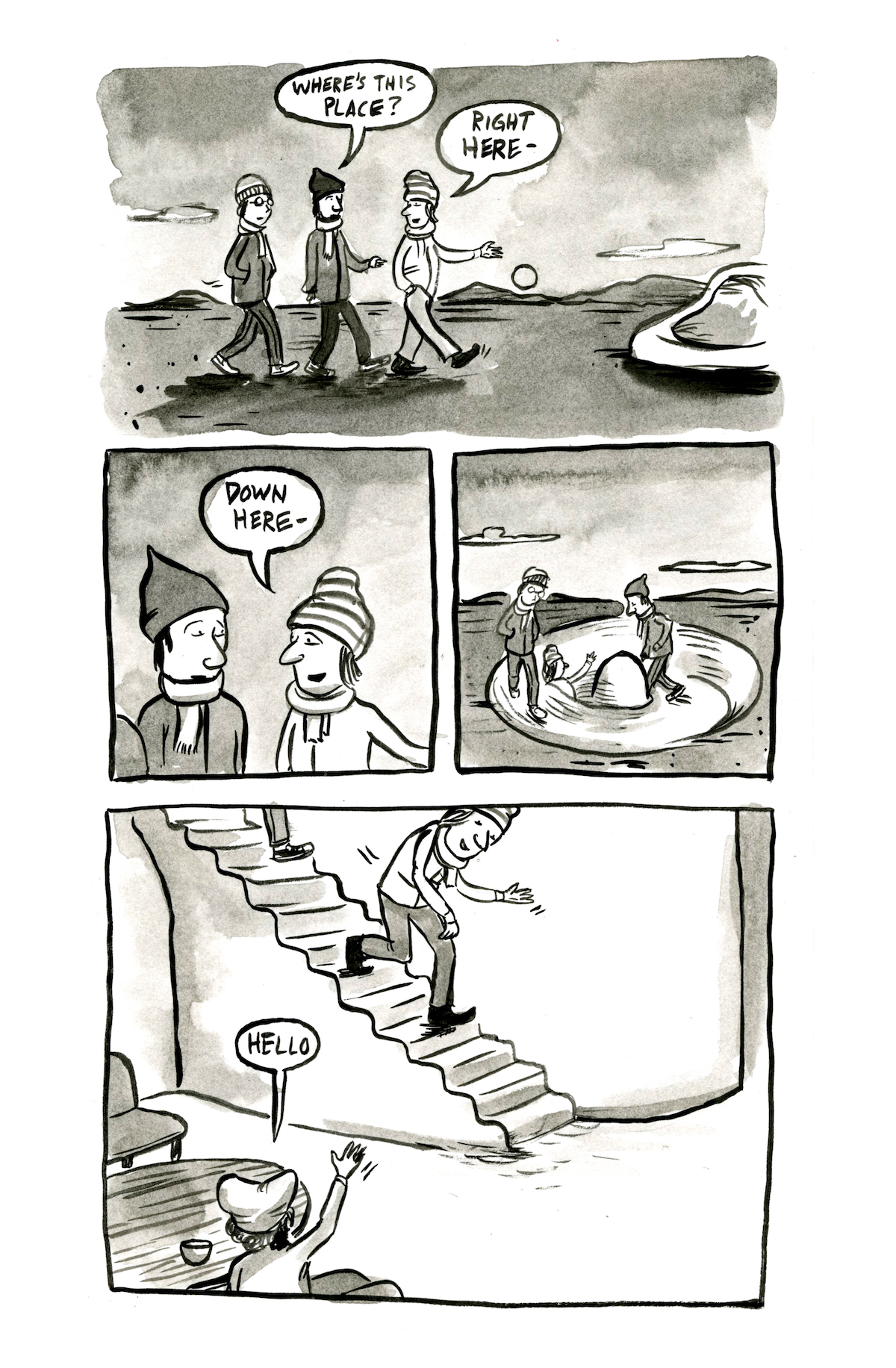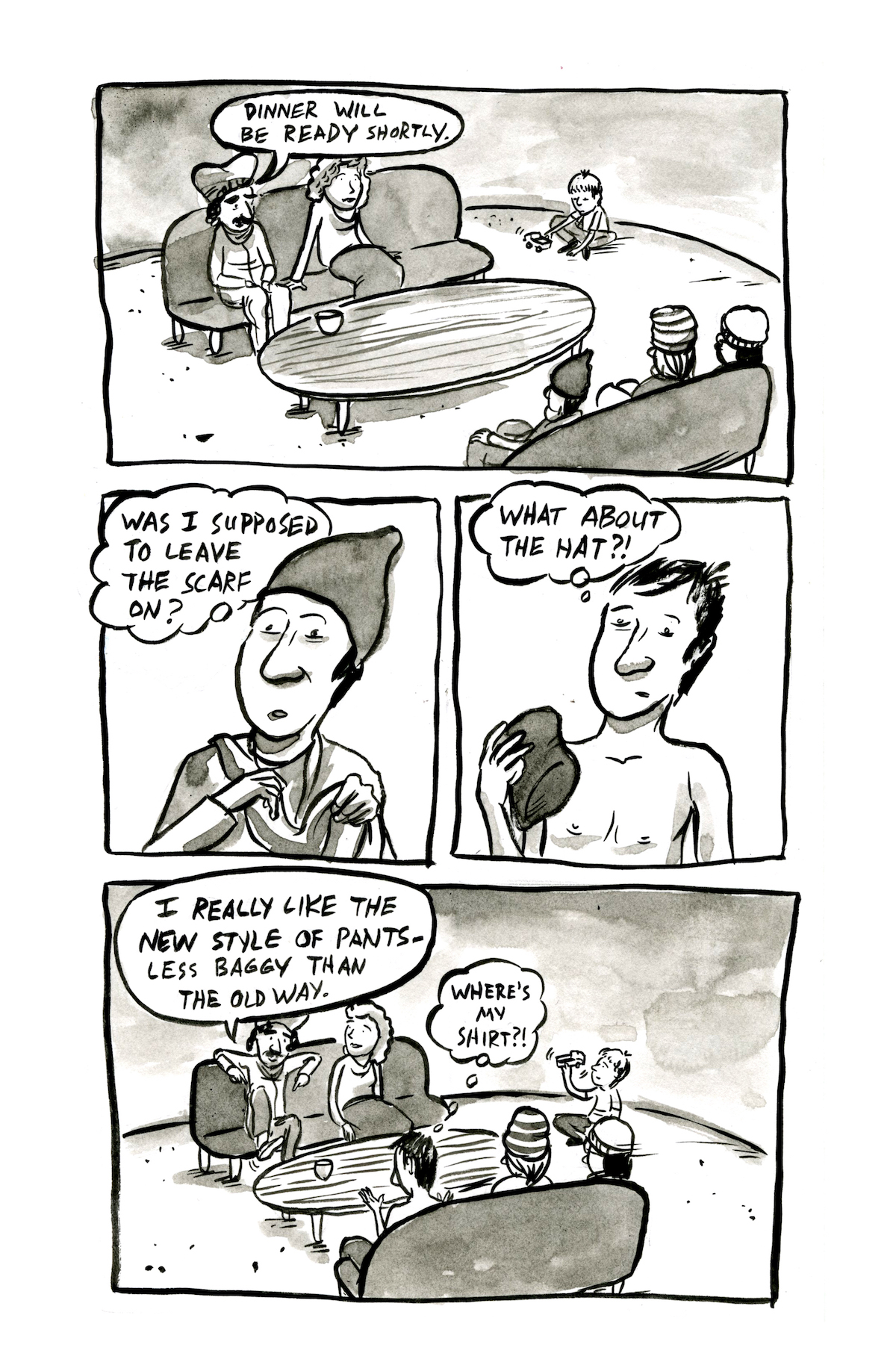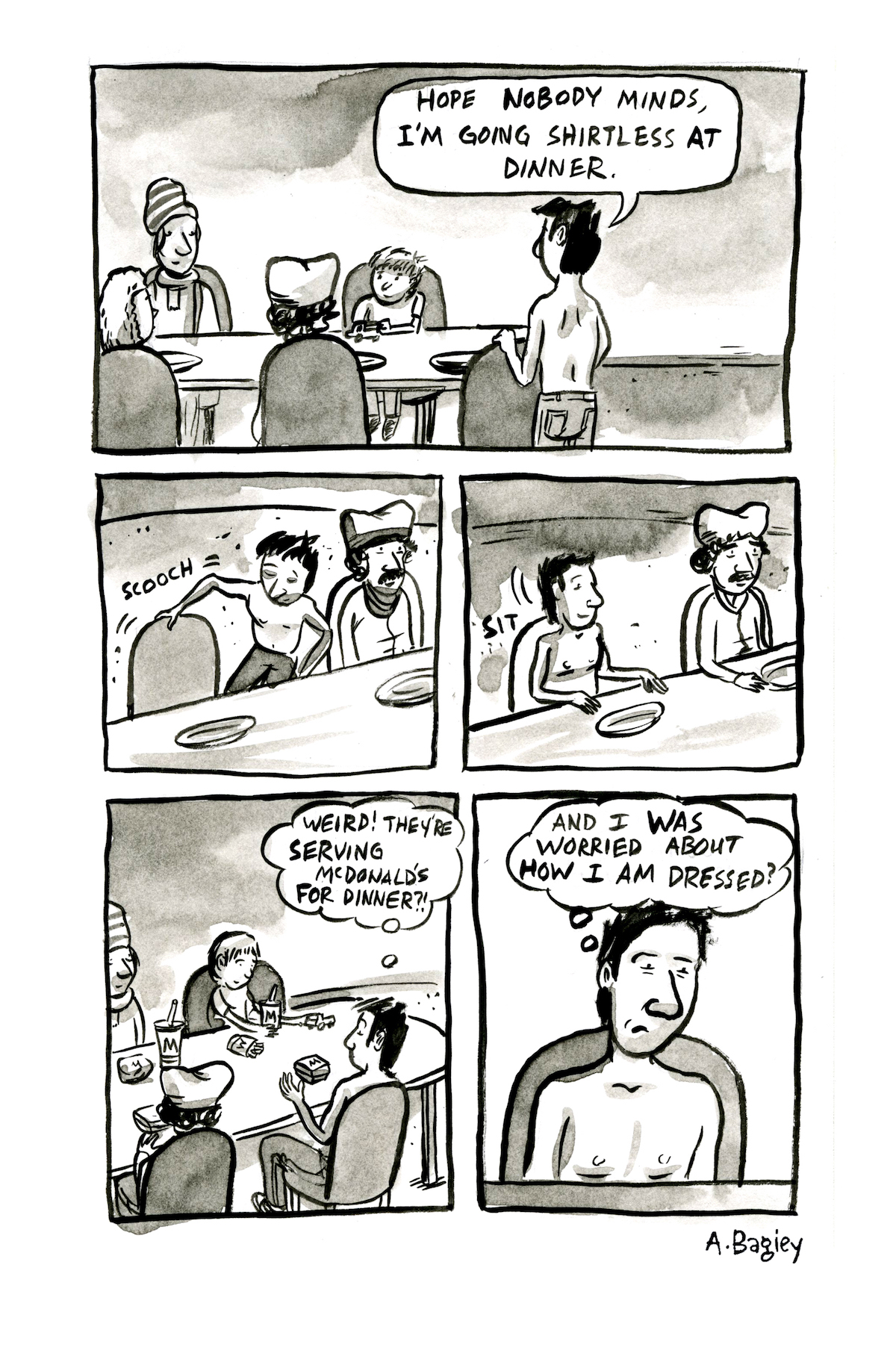Book News Roundup: The most uninviting library in Seattle?
Meghan Walker at MyBallard reports that the Ballard branch of the Seattle Public Library has "installed metal bars" around the library to discourage homeless people from loitering. Walker quotes Kip Roberson, the library's manager, as saying the changes were made in "an effort to make the space around the library inviting to everyone.” Uh...guess homeless people don't count as "everyone" in the library's eyes?
Susan Fried at the South Seattle Emerald has a great report back from this year's edition of the Seattle Urban Book Expo.
Seattle comics publisher Fantagraphics is running a big Back to School sale, meaning you can stock up on Peanuts books at a big discount.
As part of their annual micro-chapbook series, Ghost City Press is offering All Spells Are Strong Here by Catherine Garbinsky, a collection of poems created out of erasures from the work of Ursula K. Le Guin.
- from "All Spells Are Strong Here," a @GhostCityPress micro-chapbook by Catherine Garbinsky (@mrsgrrrbinsky)!!
— ElderflowerJam (@ElderflowerJam) August 27, 2018
Erasure poems of Ursula Le Guin? YES, please. It takes courage and serious restraint to take on Ursula.
These are exquisite. pic.twitter.com/ivLN3odJxX
- Jessica Dunlap at The Beat interviews Seattle writer G. Willow Wilson about her upcoming comic, Invisible Kingdom:
I’d always wanted to do a space opera type story with alien life forms that have certain things in common with us and other things not. I wanted a space to explore very big questions in an epic comic book format, questions about the difference between faith and religion, about the way in which the things that we buy come to define who we are. This is very much a story that I think – even though it’s set in a galaxy far, far away – people will be able to relate to on a lot of levels, because it does tie into a lot of the things that we’re talking about right now in the wider culture.
- The Verge is making a special "1.5 edition" of writer Sarah Jeong's 2015 book about online harassment, The Internet of Garbage, available for free. Jeong, who formerly wrote for The Verge, was recently hired as an editorial writer for the New York Times. After that announcement was made, she immediately was the target of a disingenuous backlash campaign from right-wing trolls.
The jailbreak is the easy part
Published August 28, 2018, at 11:59am
If you're looking for something great to read on your Labor Day vacation, the consistently great Hard Case Crime has published a very fine comedic crime novel from the consistently great Donald Westlake.
Light engulfs me now
a bewilderment I who was merely an afterthought
an obscure thing barely noticed among the giants
naked now to your scrutiny I who lived surrounded
cloaked in others’ luxury indistinct and anonymous
did not ask to be seen
what drifted down through their branches
what seeped into my roots
was enough
what seems to you like amputation disfigurement
was for me my only body
one by one the others taken
their branches tumbling the forest
disassembled by human hands
Seattle7Writers is back to celebrate the new Hugo House!

As much mourned as the old Hugo House was, the tide in Seattle has shifted — we haven't forgotten the old, but we're getting darned excited about the new. If you've looked at the photos and descriptions, it's impossible not to be: a tricked-out performance space, more rooms for classes, more community space for writers to gather and write.
Hugo House is a place, but it's a spirit, too, a spirit that Seattle7Writers shares. Jennie Shortridge, one of Seattle7Writers' co-founders, has a few words to say about Hugo House:
The first person I met in the Seattle writing community when I moved here in 2005 was Frances McCue, who toured me through her co-creation, Hugo House, a charmingly dilapidated reclaimed mortuary serving as the literary hub of the city. The second person I met was Garth Stein ...
Read the rest on our sponsor page, then RSVP for the grand re-opening of Hugo House on September 22.
Sponsors like Seattle7Writers make the Seattle Review of Books possible. Did you know you could sponsor us, as well? There are only four slots remaining in 2018, so move quickly to get your stories, or novel, or event in front of our passionate audience. Take a glance at our sponsorship information page for dates and details.
Your Week in Readings: The best literary events from August 27th - September 2nd
Monday, August 27: To the Bridge Reading
Nancy Rommelmann's latest true crime story is about an Oregon mother who dropped both of her children in a river. Rommelmann will appear in conversation with Seattle's own true crime author Claudia Rowe, whose book The Spider and the Fly took a new angle on the traditional serial-killer story.
Elliott Bay Book Company, 1521 10th Ave, 624-6600, http://elliottbaybook.com, 7 pm, free.
Tuesday, August 28: Cocaine + Surfing Reading
Chas Smith has written for Vice and been a war correspondent for Current TV. His new book is a history of the connection between cocaine and surfing. University Book Store, 4326 University Way N.E., 634-3400, http://www2.bookstore.washington.edu/, 7 pm, free.Wednesday, August 29: American Chordata Reading
Local editor Matthew Hitchman celebrates a new issue of the gorgeous literary magazine American Chordata with contributors. This is a good way to get a handle on one of the more exciting new-ish literary magazine on the stands right now. Elliott Bay Book Company, 1521 10th Ave, 624-6600, http://elliottbaybook.com, 7 pm, free.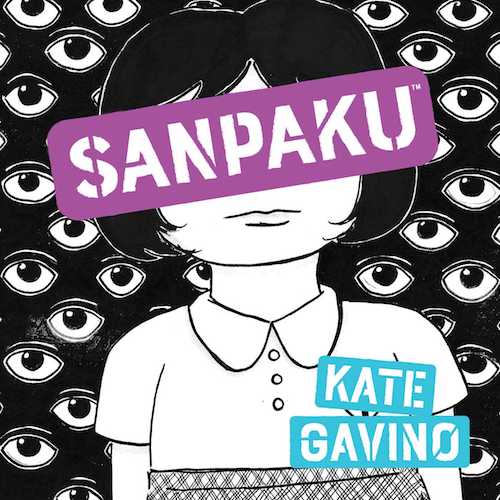
Thursday, August 30: Sanpaku Reading
Kate Gavino is the cartoonist behind Last Night's Reading, a blog featuring cartoons about author events that was then turned into a book. She's giving a reading of her own, of a new fictionalized comic memoir called Sanpaku. Elliott Bay Book Company, 1521 10th Ave, 624-6600, http://elliottbaybook.com, 7 pm, free.Friday, August 31; Saturday, September 1; Sunday, September 2: Bumbershoot
See our Event of the Week column for more details.Seattle Center, https://www.bumbershoot.com/2018-lineup/
Literary Event of the Week: Bumbershoot
Seattle has always had a hard time loving Bumbershoot. Some people quit going when the Labor Day arts festival started charging for tickets. (This seems silly to me; it costs money to pay artists and put on a show.) Some people think the big-name acts are too obnoxious. (Okay, but there's Folklife if you want a free nice, well-scaled local festival.) And some people think that the festival is now too unmoored from the city. (Who can say what the city is anymore, anyway?)
People always hate change. It's just how it is. And I try to resist it when people lament the loss of the status quo. But one element of Bumbershoot that has undeniably gotten worse over the years is the festival's commitment to the literary arts. Not too long ago, Bumbershoot brought cartoonists like Harvey Pekar and Allie Brosh to town, or novelists like S.E. Hinton and Ursula LeGuin.
Now, Bumbershoot doesn't even have a literary arts slate. Instead, they have a "Comedy & Conversation" stage, which brings stand-up comedians and podcasters and writers to the festival. On one level, this decision makes sense: writers don't pack 'em in at music festivals. But on the other hand, it's incredibly sad that Seattle's premier arts festival doesn't focus more on bringing world-class literary talent to the city anymore.
But the Comedy & Conversation stage will feature some great local writers who deserve your attention. Some highlights:
- On Friday, Seattle's slam community comes together to fight it out in the Seattle Battle of the Word.
- Youth Speak Seattle presents a program of young writers on Saturday.
- Seattle author Ken Jennings joined local musician John Roderick for a live taping of their modern-world-as-history podcast Omnibus on Saturday night.
- Most importantly, on Sunday Seattle poet and mayoral candidate Nikita Oliver hosts a program called "Think It, Say It, Do It." If I had to pick a favorite event from the full lineup, this would be the one.
Seattle Center, https://www.bumbershoot.com/2018-lineup/
The Sunday Post for August 26, 2018
Each week, the Sunday Post highlights a few articles we enjoyed this week, good for consumption over a cup of coffee (or tea, if that's your pleasure). Settle in for a while; we saved you a seat. You can also look through the archives.
Crying in H Mart
Michelle Zauner’s essay about H Mart has been everywhere this week. Zauner transforms a chain supermarket with a food court into something rich and compelling, a touchstone for remembrance and her Korean heritage. It’s a lovely piece about loss, loneliness, and home — but what makes it extraordinary is how she weights it with empathy, extending her imagination into other lives while on her weekly pilgrimage to the place that reminds her most of her mother.
It’s a beautiful, holy place. A cafeteria full of people from all over the world who have been displaced in a foreign country, each with a different history. Where did they come from and how far did they travel? Why are they all here? To find the galangal no American supermarket stocks to make the Indonesian curry that their father loves? To buy the rice cakes to celebrate Jesa and honor the anniversary of their loved one’s passing? To satisfy a craving for tteokbokki on a rainy day? Were they moved by a memory of some drunken, late-night snack under a pojangmacha tent in Incheon?
Ode to Grey
Seattle’s not a grey city or a melancholy one, but we host our share of the color — its absence in July just as defining as its presence in December. It’s a constant thread through the urban psyche, a backdrop to all sorts of brightness. Meghan Flaherty defends grey, and those who love it, making stops along the way to explore the history of the color wheel, photography, and the tyranny of sunny weather.
Ask any schoolkid to list the colors of the rainbow, and she’ll singsong you through your ROYGBIV. Seven colors: red, orange, yellow, green, blue, indigo, and violet. Newton started out with five, then added orange and indigo to sync with music — one for every step between one tonic and the next along a major scale. (Aristotle had seven colors also, but his scale stretched from white to black, not red to violet, and included yellow, crimson, violet, leek green, and deep blue.) Then there are the eleven standard colors taught in schools, which add black, white, brown, pink, and (my beloved) gray. It feels like an addendum, consolation for a color overlooked and undersung.
The Trouble with Dogs for a Writer
I’ve never before posted a piece simply because I found it unlikeable — so blame, perhaps, a too-bitter cup of coffee this morning, or the mass of laundry waiting to be done? Whatever the cause, this immense objectionable run-on by Karl Ove Knausgaard is almost self-parody, should be self-parody, maybe is self-parody. Maybe that’s the point, or maybe Knausgaard fans would claim that to be the point that I’m missing.
Or maybe it’s just that I rather like dogs.
It didn’t help that, as a human being, I was intellectually and, presumably, also emotionally superior to the dog — that I knew how to read and write, draw and paint, tie my shoelaces, butter my bread, buy sweets at the shop, and take the bus on my own — for the loud, aggressively monotonous sounds it made trumped all that; when I stood there facing it only those sounds mattered. The dog’s barks were like a kind of law, they marked a boundary I couldn’t cross, and it was the dog that enforced it. The kinship with my father’s law was obvious, since the feelings his loud voice awakened in me, all of them connected with an inability to act, that paralysis of fear, were the same as those produced by the dog’s barking. Defying the law wasn’t just unthinkable, it was impossible. That this was so made me a subordinate, which was something I knew even then, that I had the character traits of a subordinate, and more than anything else this has marked the forty years I have lived since then.
Do Men Enter Bathtubs on Hands and Knees So Their Balls Hit the Water Last?
Did you think this was a serious, high-minded weekly list of links? Wrong. If we can’t all laugh at Kelly Conaboy’s straight-faced investigation into a deeply silly question, Donald Trump truly has destroyed America. Conaboy skewers us all in this piece, including the anxious mother whose post to a baby board spawned her inquiry, but so gently and with such good humor that you’ll barely feel it.
Slightly NSFW — especially if your workplace is offended by audible snorts of laughter.
Perhaps it is not a question for doctors or children, however, and instead a question for bathtub manufacturers. Has bathtub design taken into account the fragility of a man’s balls, and if so, how? Do bathtub manufacturers have a suggested way of entering the bath, for men? Had they done research into how men enter bathtubs before designing their bathtubs and, if so, could they share any of that research with me? I reached out to several and, again, surprisingly to me, I did not hear back from most.
Whatcha Reading, Kelly Froh?
Every week we ask an interesting figure what they're digging into. Have ideas who we should reach out to? Let it fly: info@seattlereviewofbooks.com. Want to read more? Check out the archives.
Something slightly different this week! We're breaking the question-answer format to make room for some badass comic reviewing:
Kelly Froh is the Executive Director of Short Run Comix & Arts Festival. This year’s fest takes place on Saturday, Nov. 3rd at Fisher Pavilion at Seattle Center. She is also a comic artist, and sometimes, after all the dishes are done, and she’s read all the comics she bought, works on her own books.
Fruit of Knowledge by Liv Strömquist (Fantagraphics, 2018)
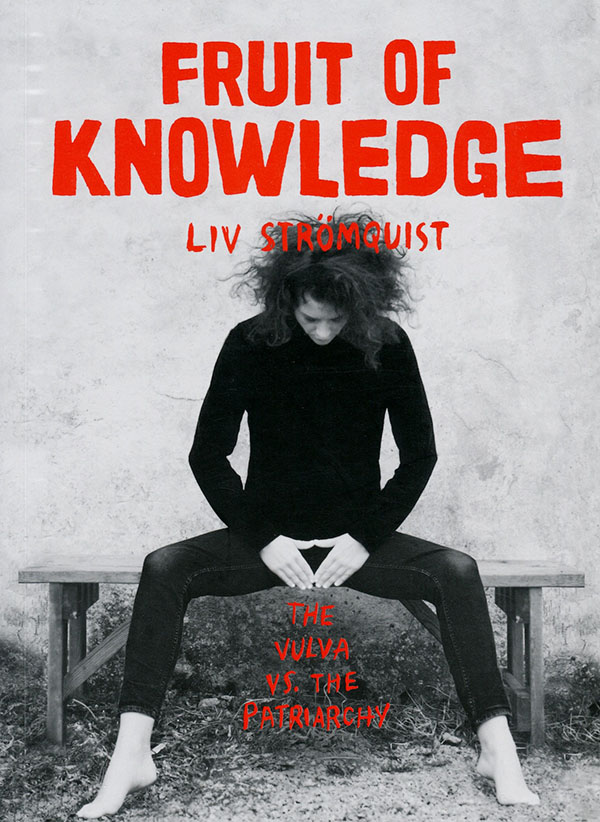
Um. I’m 44 and I learned things about my own body in this book. Strömquist provides some pretty intense research that charts not only women’s inequality (with focus on how the studying and writing about our sex organs has changed over time in order to fit Christian ideals or freakish academic interest) but also the shoddy science behind gender binaries, and the longest, most accepted myth that conveniently sells women a lot of f-ing products. Her comics make the outrage from the information in this book a bit easier to take, sort-of, I had read it in 3 sessions.
Nausea by Abraham Díaz (Kus!, 2018)

(I ordered this book from Seite Books in LA — perhaps the greatest curated selection of zines & comics I have ever seen — but Fantagraphics Bookstore in Georgetown may carry it as well!)
Three people’s nights run parallel in gritty Mexico City. Sex, drugs, and plenty of crime, this comic hits all marks. All 3 stories end worse than you can ever imagine. I love this artist’s rough drawing style so much, it’s so refreshing in contrast to the soft and fluffy stuff that is popular right now.
PP 911! by Julia K (Cold Cube Press, 2018)
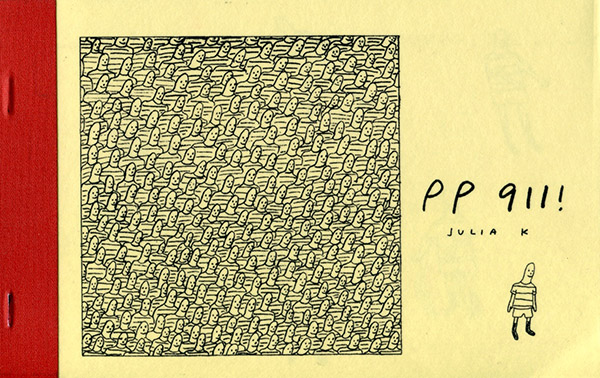
Who is this little person? Is it Julia K? Her subconscious? I really got a kick out of their quick thoughts in these short strips and single images. “Intimacy issues? Schmintimacy schissues!”
Crystal Bone Drive by Tetsunori Tawaraya (Hollow Press, 2017)
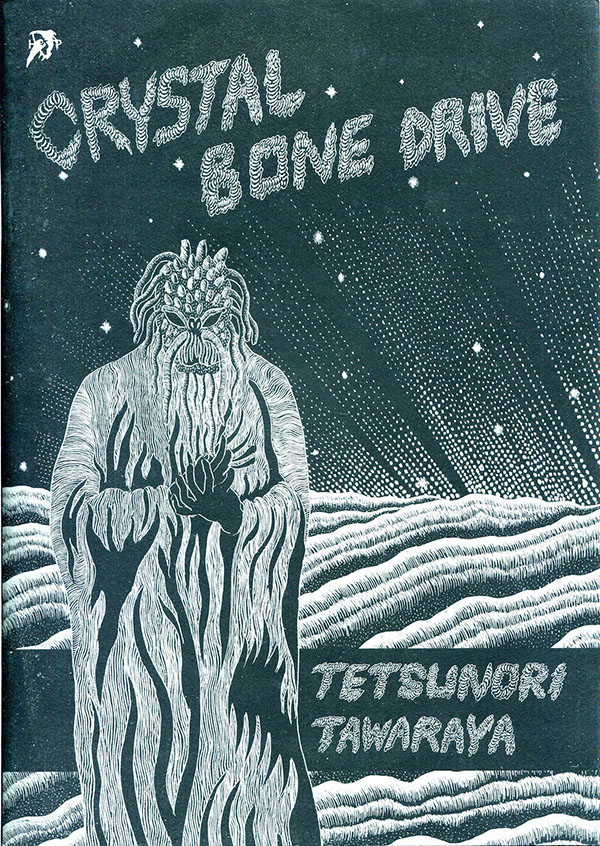
(I ordered this book from Seite Books in LA)
Ok, I admit I have no idea what the story is here (maybe like, a space adventure, with warring creatures?), but I have looked at this book 10 times because the art is done on black scratch board and printed in silver ink. It’s a beautiful book, Tawaraya’s lines are thin and perfect, you can get lost in them and forget to look at the larger image on the page. What a feat too, I mean, you can’t erase scratchboard. If you mess up you’d have to start over!
Remembering Debbie Sarow
As noted on Tuesday, Mercer Street Books proprietress and owner Debbie Sarow passed away on Monday. The store is closed in memoriam this week, but will reopen on Tuesday.
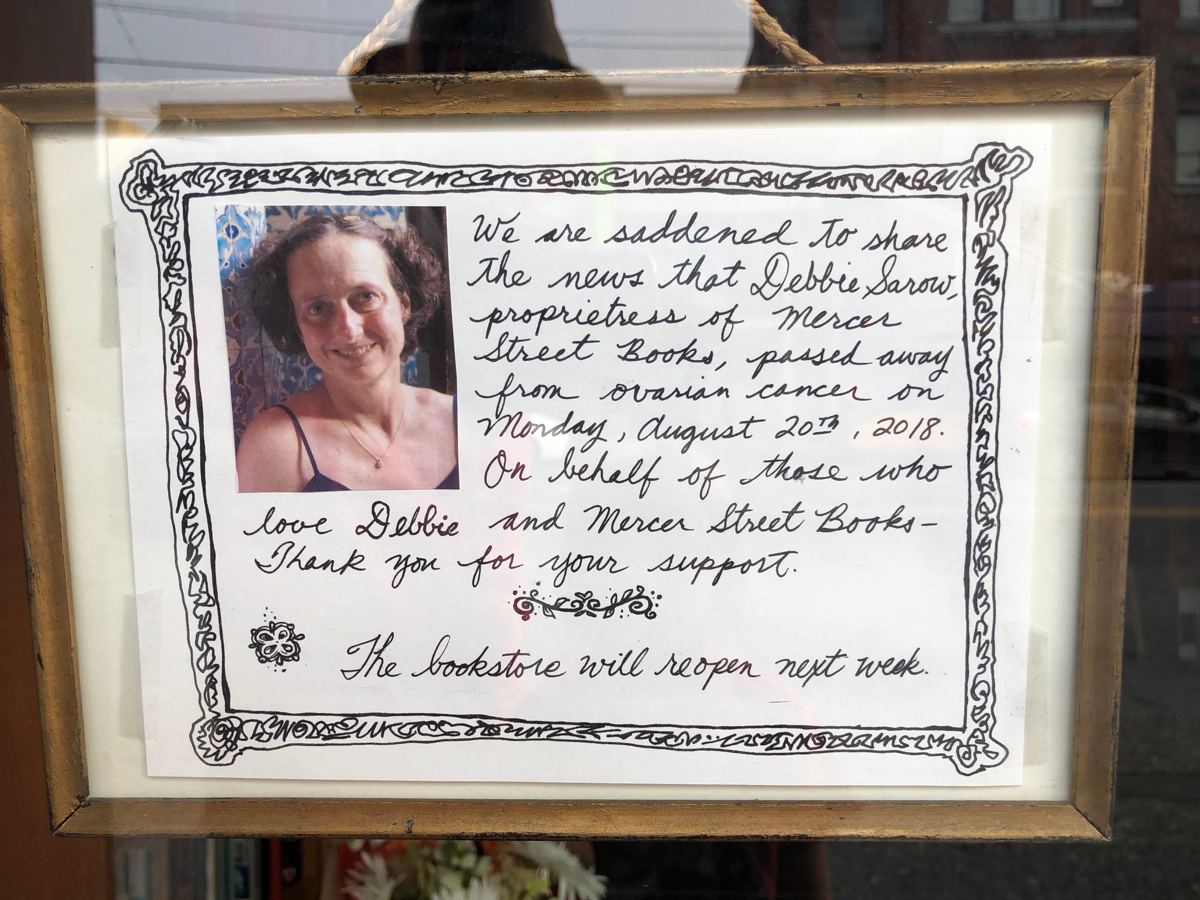
The sleepy little retail space — deeper than it is wide — at 10 Mercer Street has been a bookstore for over thirty years. Titlewave Books opened in the space in 1984. In those days what is now a Chase Bank on the corner of 1st and Mercer was Tower Books — a new bookstore with a big selection and the best-stocked magazine rack in town — so a used bookstore across the street was a nice complement. Titlewave was a good store — I recall attending readings there on more than one occasion. Rumor has it that August Wilson favored the little shop.
Titlewave closed in 2004, and 10 Mercer was taken over as a branch of Twice Sold Tales, which brought in cats and their unique take on the trade. They lasted in the space for about five years.
And then came Debbie Sarow. She bought out Twice Sold Tales, keeping the doors open during the handover, and began the transformation into making the store her own. She started with the name: Mercer Street Books. She painted the outside purple, and put up a sign that had a bird next to the logo. Her experience as a bookseller — from antiquarian and fine edition idyll Wessel & Lieberman, to many years running Twice Sold Tales just off Broadway (now an entrance to the light rail station) — gave her not only the kind of business savvy she needed to run a successful shop, but also the kind of experience that told her what kind of shop she wanted to run.
She opened Mercer Street Books and did something that few people, and fewer businesspeople, manage to pull off: she created a community. I’m going to tell my side of that story in way of eulogy.
But first, more about the store Debbie created. She was told, by some antiquarian dealers who advised her on the sale, that opening the store was a mistake, unless her goal was to lose all her money. I think it’s safe to say that, having been open nine years, she proved them wrong.
Debbie had a magnificent eye for interesting books, and the shelves in the store never feel stale or laden with those volumes that lesser stores let mill about. There is always something new, the displays updated at least weekly, often daily; there is no cat dander or litterbox smell; no dust bunnies in the corners. Debbie had an obsessive attention to detail that shows in every angle of the space.
The high shelves are lined with art and plants, the watering of which is just one of the many small details of upkeep. The antique card catalog in the front is always full of strange treasures. You'll happen upon unique shelf-talkers, some written by store aficionado and Seattle Review of Books writer Ivan Schneider, and little cards and signs hand-made by store employee and Seattle Review of Books artist Aaron Bagley (both of whom were introduced to me by Debbie). It adds up to a store with character and soul, a warm place where you could lose yourself in books for long periods of time.
The number of customers who frequent her shop, and spend many a dollar there, is staggering. It is a sitcom of regulars, a revolving cast of the old — more than one resident of the Bayview Retirement Home make their slow way down to say hello on the regular — and the young — the store maintains a marvelous kids section, and never minds a restrained young book lover sitting and reading while their parents browse — who share one thing: recognizing how special and unique the shop is.
I was one of those regulars from nearly the first day that she opened. I came in with low expectations — used bookstores are my favorite places in the world, but it is a rare store that delights me and pulls me back regularly. What I found at Mercer Street Books was always something unexpected and delightful. When my face became known, and she figured out my taste, Debbie would email me about a special typography book she had set aside, or the NYRB reprints of children’s classic. I didn’t buy all of them, but I would say I averaged at least 80%. Debbie knew her many customers, and she would scribble names and notes on index cards so that she could connect books with the people who would care about them most.
She paid good money for the few books she was willing to cull from whatever you offered. I would often send her photos of stacks of books I wanted to sell (a precursor to our Mail Call column). She’d tell me which ones she wanted and name a price, knowing I kept my personal library in good shape, so the picture was enough for her to know what the deal was worth. I loved that we could do it by email, that it saved me hauling unnecessary loads and her leafing through things that held little interest or that she had multiple copies of squirreled away in some corner.
Paying well for books means that people who collect and sell books come to her first, so the virtuous cycle of a well-stocked store starts there. And it is rare that a book lover selling a few boxes doesn’t leave with at least one or two new volumes. I know I did. Credit at the store, of which I’ve accumulated a fair pile, rarely lasted long.
Since he was a newborn, I’ve brought my son into the shop. I would park his stroller near the kids section and hand him a stack of board books, and he’d be happy as a clam while I did my rounds and chatted with Debbie. By the time he was three, and proved he loved and treated books gingerly, he would trundle back on his own steam and make a small pile that I would re-shelf when he was done, all with Debbie’s blessing. Now, at eight, he heads for the comics and graphic novels instead, but the effect is exactly the same. “Dad, can we buy this?” Is the usual refrain, and with books, I almost always say yes. Wouldn't you, frequenting the shop you want to stay in the neighborhood so that one day he'll perhaps bring his own kids in?
When I published my novel, my launch party was at the store, for which Debbie refused to charge me — she doesn’t sell new books, so wasn’t making any money from the deal (I did manage to sneak her a nice bottle of wine). It was a delightful evening for me, at least, and hopefully for the small crowd that came to celebrate. The glow of people sharing in something through those tall, folding windows has a storybook warmth about it, the kind of glow Hollywood would love to bottle.
When Paul and I started this site, Debbie was one of our earliest boosters. As many of you know, Mercer Street Books is our mailing address, since we don’t have a physical office. I had known Debbie for years at this point, and had gone from being a customer to being a person who spent extra time in the store because chatting with her was always such a wonderful way to spend my time.
I told her our plans, and then asked if she would be willing to be our mail drop. “I think the answer is yes,” she said, “but I never make any decision on the spot. I need twenty-four hours to think about it, and then I’ll let you know.” The next day she wrote to say she would be delighted. Pretty much every book ever shown in the Mail Call column has come through her door.
The best thing about this arrangement was that it allowed me to stop by daily and see Debbie. While she was normally in the shop, occasionally there would be Aaron, with his son Baxter, or Red, or Jessica, or someone else minding the shop on Debbie's rare days off, which she often spent on house calls or estate sales.
While at times Debbie was too busy to chat, or I was too busy to stay long, most nights were at least a ten-minute check-in about the day and the news of the neighborhood, of which she kept the pulse. Occasionally, when schedules allowed, I’d pass an hour or so — browsing and looking around while she would help customers — picking our conversation back up when their business was concluded.
So it was that friendship sneaks up on you, accumulated in small visits and appreciations. You get to know the people in her life, and the yearly stories; the annual trips and holiday plans, the cadence of the book world. Spring list turned to Fall list, and the packages accumulating for us would rise and fall, but every day a "hello" would open a conversation that would end with a "nice talking with you, see you tomorrow."
One of Debbie’s charms, to me, was that she was a unique person who found a way to focus her talents and idiosyncrasies into a home — a home for her, for the neighborhood, and for the people who loved her and what she created. I am certainly one of those people.
And looking back on that friendship that snuck up on me, I am heartbroken she is gone, and don't know if I quite realized how important she was to my daily life. I am so glad I got to know her and call her my friend. I’ll be forever grateful to her for what she did for me, and this site, and the graciousness and ease that she seemed to bring to all of those deals, as if her giving was all a favor I was doing for her.
But lest I make her into some kind of pushover, which I think she would roil at, she also did well from our bargains and deals. She made money on them — otherwise, why would she do it? She ran her shop so well that you would do business with her, and you would both smile, and you would both get something out of the deal. That’s the art, after all. That’s how you prove the sour antiquarians wrong, that in this day and age of internet sales and ever-fluctuating bounties on the collectability of a single title, you can make a place that people want to come to, want to stay in, want to leave their money with. Debbie was many things, and chief among those was a deliberate, and savvy businesswoman. Perhaps she may have made more if she cared less, but it was the care she brought that made the money mean something.
My thoughts and grief are with Debbie’s loved ones; for the community she created, which is so far the worse for having her gone, but so far the richer for having her as its creator and benefactor. I’m thinking of her partner Oscar, of Aaron, and Red, and Jessica. Of Ivan and the other familiar faces I’d see spending time whenever I came in.
As I’ve been telling my son all eight years of his life: “Hey, I need to drop by Debbie’s. Let’s go say hi. Who knows what we’re gonna see?” And then we’d pull up and there would be her tan bike bolted to the rack outside, the bike she rode each day to and from her home in Ravenna. We knew we could go in and spend a little time, and catch up, that we were in a place we felt connected to and welcome in. It's going to be hard to go and not see that bike anymore. Its absence is going to be a reminder of hers. It was one thing I noted the other day, when my son and I went to leave flowers at the door.
Goodbye, Debbie, and thank you for everything. Goodbye, and thank you for the people you collected and made family. I’m so honored that I got to play my own small part in your story. Looking outside, at this writing, at the ashen sky seems fitting, an atmosphere flown at half mast in your city. I love you, my friend, and I’m so grateful to you and everything that you so carefully, deliberately, and lovingly created in this world. Goodbye.
The Help Desk: How do I force my child to enjoy reading?
Cienna Madrid, our literary advice columnist, is on holiday this week; please enjoy this column from 2015. Do you need a book recommendation to send your worst cousin on her birthday? Is it okay to read erotica on public transit? Cienna can help. Send your questions to advice@seattlereviewofbooks.com.
Dear Cienna,
My son hates to read. The rest of the family? That's all we do. We don't have a TV, even. The other five of us could pass every moment of every day with our noses in a book, but our son wouldn't read chocolate if it were a book. We bought him a computer, and he's getting pretty good at programming and really likes it, but I think he needs to let his eyes rest from all of the vibrating pixels every now-and-again. He thinks we're all (the wrong kind of) nerds, and wants us to learn more about the internet. What kind of compromise do you think we can find?
Georgia in Georgetown Heights
Dear Georgia,
You can't force your loved ones to enjoy your hobbies – if that were possible, all of my friends would be wild about American Girl cosplay and farm-to-table spider farming. That said, if your son is programming, he is reading – you just don't get his language.
<p class="noindent”>So buy him a few books that suit his interests and make a parental decree: Read for an hour, then your child can computer (and yes, you should definitely be letting him show off his internet skills). The method works: It's how I eventually weaned my cat off porn. <p class="noindent”>It's difficult to recommend specific books without knowing your son's age and abilities but Python for Kids: A Playful Introduction to Programming and 3D Game Programming for Kids: Create Interactive Worlds with JavaScript both come highly rated for kids 10+. If he's a little bit older, I'd throw in William Gibson's cyberpunk classic, Neuromancer. In fact, that might be a fun book to read and discuss as a family book club project, you nerds.Kisses,
Cienna
Portrait Gallery: Sasha LaPointe
Each week, Christine Marie Larsen creates a new portrait of an author or event for us. Have any favorites you’d love to see immortalized? Let us know

Thursday, August 23: Next Exit
This is a celebration of indigenous artists including a number of exciting young bands, as well as the poetry of Sasha LaPointe, Sara Marie Ortiz, and DinéYazhi. Artists from Washington, Oregon, and New Mexico will appear at this event.
Henry Art Gallery, UW Campus, 543-2280, http://www.henryart.org/, 6 pm, $12
Criminal Fiction: the smoky skies of summer
Every month, Daneet Steffens uncovers the latest goings on in mystery, suspense, and crime fiction. See previous columns on the Criminal Fiction archive page
Reading around: new titles on the crime fiction scene

Ever since Blacklands, her gripping 2010 debut, Belinda Bauer has proved over and over again that she’s a master not just of spinning suspenseful tales, but of imagining the most unsettling motivations for crimes. In Snap (Atlantic Monthly Press) – longlisted this year for the Man Booker Prize – a pregnant mother disappears and is found murdered; three years later, her three children are running feral in a house filled to the brim with old newspapers. The oldest, Jack, looks after his sisters, bringing them food and books – most recently, Stephen King’s It – via his part-time job as a small-time burglar. Meanwhile, another heavily-pregnant woman finds a disturbing note by her bedside. As multiple lives converge, Bauer keeps things progressing, and us guessing: she always seems to have just one more nifty twist up her voluminous sleeve.
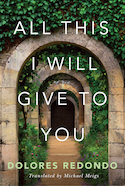
I’ve been waiting to read Dolores Redondo’s All This I Will Give to You (AmazonCrossing, translated from the Spanish by Michael Meigs), since it won the 2016 Premio Planeta literary prize and garnered all sorts of accolades as a hybrid literary-commercial thriller. A baggy doorstop at more than 600 pages and a little bit loose, editing-wise, I found that I had to stick with it at times, particularly at the beginning. Ultimately, though, it pays off in spades: the Galician setting, its scraggly landscape persistently misted in a gentle rain, is a pleasure to spend time in, and once the familial mysteries rear their compelling heads, things speed up quite a bit. There’s a tart-humored cop who’s determined to pursue a fatal case that’s been written off as accidental; a matriarch right out of a Gothic horror story; and a writer who thinks he knows everything – and then falteringly steps up to the plate as his world falls apart. A bit of a journey, but worth it.
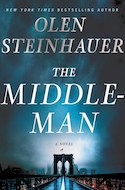
In The Middleman (Minotaur), Olen Steinhauer pulls no punches: pretty much a thriller for our time — of our time, really — this tour-de-force is a propulsive melange of the convoluted intrigues inherent in undercover work, and of forces for good battling forces for evil. The plotlines tidily juggle a suburban garden party with an organizational operation mid-action; pit the power plays of activist leaders against the political machinations behind national espionage institutions; and lets the cards fall where they may. Be sure not to miss Steinhauer’s acknowledgements which briefly but richly reflect on the current relentless political and cultural dissonance, as well as on the invaluable guidance of an astute, thoughtful, and perceptive editor.
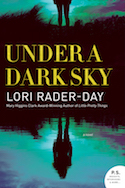
When she finds that her husband made reservations at a dark sky park for what would have been their 10th anniversary, widowed Eden Wallace decides to honor his plans on her own in Lori Rader-Day’s Under A Dark Sky (William Morrow). But what Eden thought was a private reservation turns out to be somewhat of a party house: she has a suite to herself, but is sharing communal space with a clutch of college friends. Handsome Malloy seems to be the leader of the group, the man-glue that holds things together: he’s encouraged Sam to gun for a promotion; dated Paris who is now with Dev; and basks in being the apple of Martha’s eye. But this is no Big Chill-style reunion as becomes starkly clear when one of the twentysomethings is discovered on the kitchen floor with a screwdriver in their throat. There’s nearly one red herring too many here, but Rader-Day holds the psychological-thriller-helm steady as she goes.
The Quintessential Interview: John Straley
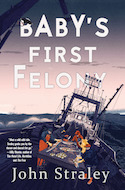
John Straley, the 2006-2008 Alaska State writer-laureate, masterfully balances semi-comic crime-caper elements with pitch-black criminal activities in Baby’s First Felony (Soho), resurrecting criminal-defense investigator Cecil Younger for his first outing in 17 years. The Sitka, Alaska, fishing industry-centered setting embraces a plethora of slightly mad, slightly bad characters, all alarmingly overshadowed by the real – and truly evil – villain. On a more informational note, the novel is shot through with entertaining ruminations on the seminal elements of Baby’s First Felony, “a self-help book….Intended for intellectually challenged criminals,” based on Younger and his boss’ experiences with their clients. (A complete and illustrated version is handily included at the back of Baby’s First Felony, the novel).
What or who are your top five writing inspirations?
I’ve been inspired by the people I met working as a criminal investigator, and by listening to stories in bars and jail cells.
I love jokes and poetry and traveling by boat.
I like talking to strangers who are reading big fat books while sitting alone in noisy cafes.
I often get my best ideas for wild action scenes while sitting in poetry readings.
Top five places to write?
I love writing at my desk which has a window looking out at a cherry tree I planted by putting a cherry pit in a stump while chopping wood long ago. Now it almost blocks my view of the water.
I like writing notes at the Backdoor Cafe while drinking black tea.
I write notes on the bench in front of the Pioneer Home on sunny days.
I write in my journal on the flimsy tables on Alaska Airlines when I’m flying to Seattle to see my eye doctor.
I used to write notes in the interview room at the Sitka Jail while waiting for a prisoner, but no more: now it’s just me and my cherry tree.
Top five favorite authors?
For years I was working on the list of books that I had lied to people about reading; I was an English major so the list was long. But by reading a lot of good books I got hooked on re-reading classic books I didn’t really understand when I read them as a student.
I have to say I still love Steinbeck, and Hemingway was a lot sadder than I had remembered. I found his stuff very moving when I went back to it. Yes, he was a pompous jerk at times, but hey, who isn’t in these times?
I got turned on to Willy Vlautinand I love his novels and how he treats people in the West. I studied with James Welch from Montana and he changed my life. His Riding the _Earthboy 40 knocked me out, and the Death of Jim Loney made me think for the first time that Western Literature was on par with what the Russians had done.
In poetry I adore Pattiann Rogers and think she is a national treasure.
Top five tunes to write to?
Now? Let me think… while I’m writing I don’t want to be too distracted by the lyrics so it has to be instrumental OR it has to be something I have listened to so much that the lyrics are just built into the background of my brain. I need soothing and then energizing tunes for different times.
- “Crosseyed Cat” by Muddy Waters
- The Goldberg Variations played by Glenn Gould
- “Streets of Bakersfield” by Dwight Yoakam and Buck Owens
- Vivaldi’s _Four Seasons with Pablo Casals
- “My Dog Can Bark” by Treat Her Right
Top five hometown spots?
My House. Really. It’s great.
I love the top of the O’Connell Bridge, which runs from Sitka over to Japonski Island, at sunset. It’s a beautiful view of the harbor and a nice walk either way.
Walk through the Sitka National Historic Park in the rain: beautiful totems, good cover, great trails.
The Pioneer Bar on a Sunday morning when it’s not crowded. Great old fisherman’s bar. They may not smoke in bars in Brooklyn or Ireland, but as of this writing they are still smoking in the Pioneer. That’s why I go in when it’s empty, and will be there when the AA crowd is drinking coffee, checking out the beautiful gallery of fishing boats on the walls.
The Be-Ak (sic) cafe on Sunday for brunch. I go there to play music with my buddies every Sunday. We play mostly blues and swing music and a smattering of gypsy jazz. Guitar, mandolin, bass, and ukulele, and anyone else who wants to jump in: old guys who are experienced players who show respect to each other and the crowd. Not too loud or too irritating. After a week at my desk, it’s my one bit of social interaction.
Then of course there’s Old Harbor Books. Great assortment of everything, with an emphasis on local and Alaska.
Thursday Comics Hangover: The cartooning librarian
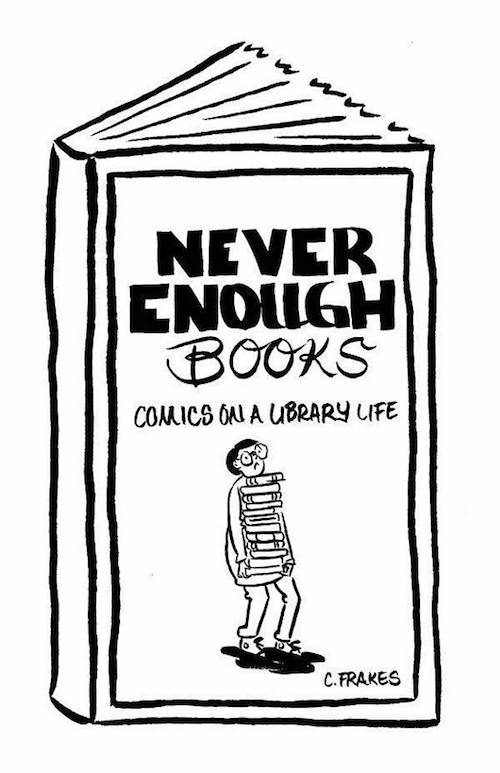
To a lot of bookish nerds out there, Colleen Frakes is living the dream: she's a librarian who draws comics in her spare time. And while Frakes is always very present in her work — seriously, read her memoir Prison Island — I've rarely seen her discuss her bookish life in her work. I've always wanted to read that book.
So when I was browsing the local cartoonist shelf at Phoenix Comics recently and I found a mini comic by Frakes titled Never Enough Books: Comics on a Library Life, I didn't hesitate for a second. I bought the book and read it immediately. (To be clear, Never Enough Books is only new to me; the indicia says it was first published in fall of last year.)
Never Enough Books is a collection of short autobiographical essays in comics from explaining Frakes's lifelong love affair with books. From her childhood as a self-described "'spend every recess in the library' type indoor kid" to her first librarian position at the Center for Cartoon Studies, Frakes explains what books have given her — and done to her.
If you grew up as a bookish nerd, you'll see yourself in these pages. Frakes is a genial host who romanticizes books while keeping her own mildly misanthropic tendencies in full focus. No, books can't cure everything. Yes, books do make everything better.
My one quibble with Never Enough Books is that it feels like a 90-page graphic novel crammed into a 12-page mini comic. I'd love to read a whole comic autobiography about becoming a librarian — perhaps with interesting moments in library history interspersed in the personal narrative. So far as I know, no cartoonist has ever made a book like that. The world is ready for the comics version of Nancy Pearl, and Frakes couldn't be more suited for that position if she were engineered in a laboratory.
Phinney Books owner Tom Nissley is opening a new shop: Madison Books, slated for a space in the heart of Madison Park. It's an exciting development; Madison Park has been without an independent bookstore since Madison Park Books closed in 2005. And it's a testament to how much the neighborhood wants a bookshop. The venture is supported by lifetime resident Susan Moseley, who's been trying to bring a bookstore back for more than a decade.
With James Crossley of Island Books stepping up to run the store, there's some exceptional talent in play — people who know who to do general interest curation, and know how to make a small space sing. We'll follow up with them in the weeks to come for a rundown on their plans and projected opening date.
The poet and the zen teacher
I recently encountered this Town Hall Seattle onstage conversation between poet Shin Yu Pai and zen teacher Peter Levitt. I don't know much about zen teachings, but Pai proves to be a really great interrogator. I think her investigative artistry, as well as her career as a poet, helps her to be a compassionate and curious religious investigator.
I'd love to see a reading series in this city that puts local poets to work examining religious belief by pairing with visiting authors of spiritual books. Perhaps when Town Hall reopens, they'll consider taking on a new series.
Talking about the Russia stuff with Keith Gessen
Keith Gessen's second novel, A Terrible Country is funny and thoughtful and more than a little bit sad. It's about a young man who returns to his ancestral home of Russia to take care of his dementia-addled grandmother, and like any great novel, it contains a multitude of perspectives and concepts — smuggled away in the fiction you'll find dialogues about capitalism versus communism and little reviews of Tolstoy's lesser novels and meaningful critiques of United States foreign policy in the 21st century. It's a masterful novel — one that will rightfully stand near the top of most year-end best-of lists.
Unfortunately, Gessen published A Terrible Country at a point in our history in which everyone wants to talk about Russia only in one context: the election of Donald Trump. When Gessen appeared at Elliott Bay Book Company earlier this month, we talked at length about Russia and the United States. What follows is an edited excerpt of our discussion.
You started writing this book at a time when the United States had a very different relationship with Russia, when people here didn't really think about Russia at all. And of course now, after the 2016 elections, you can't go on Twitter without bumping into a liberal Democrat who is putting together a wild conspiracy theory about how Russia hand-picked Donald Trump at birth as the central figure in a long-term plot to overthrow the U.S. We've got kind of a new Red Scare going on. Can you talk about writing the book at a difficult period in US/Russia relations and publishing the book in the US under President Trump?
When I started writing [A Terrible Country] in 2009, Russia was not a hot topic. I kept writing it and writing it and then Russia invaded Ukraine and everybody was super-interested in Russia. And I was like, 'fuck! I should have finished this book because everybody cares about Russia all of a sudden!'
But lucky for me, they interfered in our elections, so people still care about Russia! It's a double-edged sword, right? Because I had written this book that actually complicates the narrative about Russia, and at the same time I think I'm benefiting from the fact that people want to talk to me because they want to talk about how evil Putin is. So it's tricky, but it's also an opportunity.
People are so desperate to know. I wrote this thing in the New York Times Magazine about American policymakers who worked on Russia going back to 1981. It was a very niche piece about policy. It was very wonky. My wife refused to read it — and she's very nice, very supportive, but she's like, 'this is too boring for me.' And yet, it was published because people are so desperate to read about Russia.
The other tricky thing about Trump/Russia that I can tell you as a person who knows about Russia is that Russians aren't that good at doing stuff. I had an event last night in DC with Olga Oliker, who is a very smart, funny political scientist. And this question came up and she said the myth of Russian competence does not survive a meeting with actual Russians.
[...]
So these weren't super-geniuses, but they happened to come upon a incredibly divided country whose institutions were breaking down, and whose one party was willing to take advantage of this.
One of the things I learned from one of the Trump/Russia books is that Mitch McConnell — when the Obama administration was trying to really raise the alarm [about Russian interference in the election] but not do it in a partisan manner, they were trying to get the Republican leadership on board. They wanted to warn the state electoral boards that they should be thinking about how to secure their machines. McConnell said, "nope, not doing this. You can't do this. I will raise hell."
So I kind of feel like every time Time magazine wants to publish a cover with a headline about "the face of evil" and there's a picture of Putin, I think that if they just replaced that picture with a photo of McConnell, I would be much happier. That would make much more sense.
So yeah, for me he Trump/Russia story is really a Trump story — Trump and the GOP.
Siri, find me a date
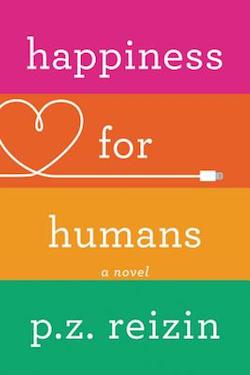
Last week, I listened to the audio book version of Happiness for Humans, a novel by British author P. Z. Reizin. The novel's a romantic comedy set-up is a relatively twist on the matchmaker genre: an artificial intelligence begins to secretly set up Jen, its human trainer, on dates.
Eventually the AI, which is named Aiden, begins to develop emotions. It becomes heavily invested in Jen's happiness, and then a cast of artificial intelligences — some of them malicious — begin to meddle with the experiement. It all feels a little bit like a play where capricious gods toy with humans for their own amusement, only to receive their comeuppance in the end.
Happiness for Humans was exactly what I needed. After a long summer of depressing news, I wanted to listen to a story that was funny and cute. But all the way through, I felt a particular unease with the concept of, basically, a Siri or Alexa toying with human behavior. Because, uh, Siri and Alexa are already toying with human behavior, and the end results are nothing like a rom-com.
Fiction about AI tends to come in two flavors: either the technology is malicious and it wants to take over the world; or it's cute and friendly and British and a little bit too proper, like C-3P0. Happiness tries to do a little of both, but it mostly leans on the adorable British side of things. I'd love to read a novel that addresses the idea of artificial consciousness in a contemporary setting in a way that adds nuance and complexity to the situation.
Of course, it's impossible to track every trend in publishing; maybe the AI novel I'm describing already exists. But for right now, the closest thing to a complicated AI story that I've seen in recent years is Spike Jonze's splendid Her. Happiness for Humans doesn't come close to Her's level of artistry and curiosity. Unlike Aiden, the literary consideration of implications is still waiting to take the next evolutionary leap forward.
Debbie Sarow
It is with the saddest of hearts that I report that Debbie Sarow, proprietress and owner of Mercer Street Books, passed away on Monday morning. After spending the last few weeks in Paris, she came home to Seattle. She was surrounded by loved ones, including her partner Oscar, and long-time friend and bookstore employee Aaron Bagley.
Mercer Street Books is closed this week in memorium, but will reopen next. Drop by this week and leave flowers at the door, if you are one of the many who Debbie knew and touched. Drop by next week and buy some books. As a way to celebrate her life by bringing the Seattle book community together, I can't think of a better method. Say hello to the people still running the shop, no doubt missing Debbie so much more acutely than us on the outside.
We are heartbroken at this news. Debbie was very important to us at the Seattle Review of Books. I'll follow with a more personal rememberence in the days to come.
[ ]
what was left to admire
something
meaningless as jangledkeys a muscle twitching
aimless but alivenothing recognizable except the blood
none of us wanted to say we were “with” him
when the news trickled in
local in the first days
then the smell of iteverywhere
how the hand on the revolver
was his and hungry
and the shotswould not be undone

